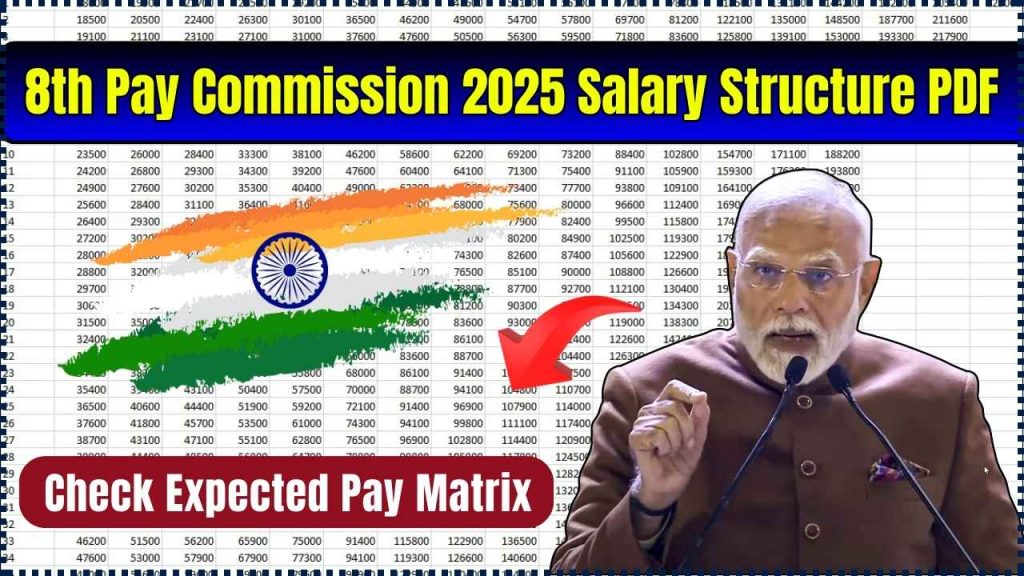
The 8th Pay Commission 2025 is a significant topic of interest for central government employees and pensioners across India. As the country anticipates the new pay matrix, speculation is rife about potential salary hikes, revised allowances, and the impact on overall compensation. In this article, we will break down everything you need to know about the 8th Pay Commission salary structure, expected changes, and how it may affect government employees.
8th Pay Commission 2025
| Topic | Details |
|---|---|
| Expected Implementation Year | 2025 (Tentative) |
| Anticipated Fitment Factor | 3.0 to 3.68 (Expected) |
| Minimum Basic Pay Increase | From ₹18,000 to ₹50,000 (Speculated) |
| Applicable To | Central government employees and pensioners |
| Source for Official Updates | Government of India Official Website |
The 8th Pay Commission 2025 is highly anticipated by government employees and pensioners, as it promises significant salary hikes and revised allowances. While the exact pay matrix is yet to be finalized, expected changes indicate substantial improvements in employee compensation. Stay updated with official sources to get accurate information.
What is the 8th Pay Commission?
The Pay Commission is a periodic review body established by the Government of India to revise salaries, allowances, and benefits of government employees. The 7th Pay Commission was implemented in 2016, leading to a substantial increase in basic pay and dearness allowance. Now, employees are looking forward to the 8th Pay Commission in 2025, which is expected to further revise salaries in line with inflation and economic growth.
Why is the 8th Pay Commission Important?
The Pay Commission plays a crucial role in determining the salary structure of millions of government employees. A well-planned revision ensures that:
- Employees receive fair and competitive compensation.
- Inflationary pressures on salaries are accounted for.
- The purchasing power of government employees remains strong.
- Economic balance is maintained between the private and public sectors.
- Attracting and retaining skilled personnel in government jobs remains feasible.
Expected Salary Hike & Fitment Factor
One of the biggest questions surrounding the 8th Pay Commission is the fitment factor, which determines the increase in basic pay. The 7th Pay Commission used a fitment factor of 2.57, leading to a significant salary jump. For 2025, experts predict a fitment factor between 3.0 and 3.68, meaning basic pay could increase substantially.
Expected 8th Pay Commission Pay Matrix
Here is an estimated comparison of basic salaries under the 7th and 8th Pay Commissions:
| Pay Matrix Level | 7th CPC Basic Salary | Expected 8th CPC Basic Salary |
| Level 1 | ₹18,000 | ₹50,000 |
| Level 2 | ₹19,900 | ₹54,500 |
| Level 3 | ₹21,700 | ₹58,000 |
| Level 4 | ₹25,500 | ₹63,500 |
| Level 5 | ₹29,200 | ₹70,000 |
| Level 6 | ₹35,400 | ₹80,500 |
| Level 7 | ₹44,900 | ₹98,000 |
| Level 8 | ₹47,600 | ₹105,000 |
Note: These figures are based on expert predictions and may vary once the official announcement is made.
Allowances & Benefits: What to Expect?
Along with salary hikes, the 8th Pay Commission is also expected to revise several allowances. Here are some key components:
1. Dearness Allowance (DA)
- Currently at 46%, expected to increase further.
- Will be revised twice a year based on inflation rates.
2. House Rent Allowance (HRA)
- May increase by 20-30%, depending on the employee’s location.
- Metro cities could see higher HRA revisions.
- Greater focus on ensuring rent affordability in high-cost cities.
3. Transport Allowance
- Likely to rise in response to fuel price hikes.
- Employees in Tier-1 & Tier-2 cities will receive better benefits.
- Increased flexibility for travel reimbursements for official duties.
4. Pension & Retirement Benefits
- Expected higher pension revisions for retired employees.
- Increased gratuity limits.
- More flexible pension investment options to ensure long-term financial security.
Implementation Timeline & Government Standpoint
The 8th Pay Commission 2025 is expected to be implemented from January 2026, following necessary approvals. The government will consider:
- Economic viability of the hikes.
- Balancing fiscal deficit and employee benefits.
- Impact on private sector parity.
- Adjustments based on cost-of-living and inflation trends.
How Will This Affect Government Employees?
For government employees, a salary revision means:
- Higher take-home pay due to increased basic salary.
- Improved allowances, boosting financial security.
- Better pension benefits, securing post-retirement life.
- Greater spending capacity, leading to economic growth.
- Enhanced job satisfaction due to competitive compensation.
ISRO’s Historic 100th Launch Shocks the World—Here’s Why It’s a Game-Changer for India
Sensex Jumps Over 400 Points, Nifty Crosses 23,000 Mark – Indian Markets Rally
Indians Shaping the World: 10 Nations with the Largest Indian Communities
FAQs About 8th Pay Commission 2025
1. When will the 8th Pay Commission be implemented?
The expected implementation year is 2025, with salary revisions likely to be applicable from January 2026.
2. What is the expected fitment factor?
The projected fitment factor is between 3.0 and 3.68, leading to a 50-70% increase in basic salary.
3. Will there be changes in allowances?
Yes, HRA, DA, transport allowance, and pension benefits are expected to be revised upwards.
4. How much will the minimum salary increase?
Currently, the minimum basic pay is ₹18,000. Under the 8th Pay Commission, it may increase to ₹50,000 or more.











